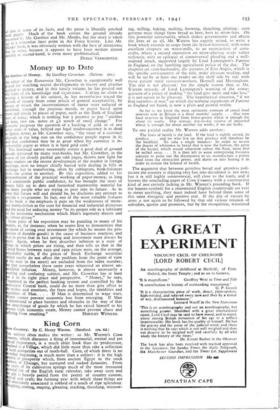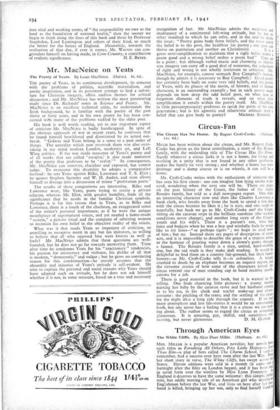King Corn
rn Country, By C. Henry Warren. (Botsford. rag. 6d.) HE subject often-makes the writer : so Mr. Warren's Corn rurY, which discusses a thing of immemorial, eternal and yet 'cal importance, is a much abler book than its 'predecessor, gland is a Village, which did little more than take a collection rural antiquities out of moth-ball. Corn, of which there is no (3rderi beginning, is much more than a subject: it is the high 1331 of prosperity which, from ancient Egypt to the stock rkets of Chicago, has nurtured and rocked dynasties. From e cycle of its cultivation springs much of the most treasured rtonal life of the English rural calendar; take away corn and egilt is heavily peeled from the poetry of country custom, rival and craft; the farming year with which these things are obstinately associated is robbed of a touch of ripe splendour. tlabrug, sowing, reaping, gleaning, stacking, threshing, winnow- ing, milling, baking, making, brewing, thatching, plaiting : corn governs most things from bread to beer, beer to straw-hats. On this powerful universality, which shakes governments and affects the lives of us all, Mr. Warren has eagerly seized, to write a book which extends in scope from the lyrical-historical, with some excellent chapters on water-mills, to an examination of corn- crafts, where a second exposition on straw-plaiting reads rather tediously, with an epilogue of controversial pleading and a well- ordered attack, supported largely by Lord Lymington's Famine in England, on the fumbling agricultural policy of the day. The chapters on corn-husbandry, the pictures of East Anglia, which is the specific corn-country of the title, make pleasant reading, and will be set by at least one reader on the shelf side by side with those patient rural research-workers, Hennell and Massingham. The rest is not pleasant : for the simple reason that, as Mr. Warren remarks of Lord Lymington's warning of the conse- quences of a policy of making " the land give more and take less," it is not meant to be pleasant. The hypothetical situation, " if we find ourselves at war," on which the warning arguments of Famine in England are based, is now a plain and painful reality.
So far as we know the most optimistic estimate of cereal food reserves now in Britain is a three months' supply. . . . Our own food reserves in England from home-grown wheat is enough for about six weeks. Our average day-to-day reserve of imported wheat is enough for about another six weeks, if we are lucky.
To one painful reality Mr. Warren adds another :
The basis of health is the land. If-the land is rightly served, its produce . . . and we who live on that produce will therefore be the healthier. To take a single instance: In order to secure the degree of whiteness in bread that is now the fashion, the germ of the kernel, which would otherwise colour the flour, must first be milled away. . . . It is then left to some enterprising business concern to point out the discrepancy to us, manufacture a patent food from the abstracted germs, and alarm us into buying it in order to restore the balance of health.
The argument that between germless bread and germless poli- ticians the country is slipping very fast into decadence is not new; but it is still highly controversial, still close to the truth, and it leavens the concluding pages of Corn Country with a constructive kind of zest entirely lacking in Mr. Warren's preceding book. If the banner-symbols for a rejuvenated English countryside are ever to mean anything, they must indeed have behind them some of this same energetic and positive zeal. If the day of victory by arms is not again to be followed by that old vicious rotation of subsidies, quotas and promises, but by the recognition, translated into vital and working terms, of "the responsibility we owe to the land as the foundation of national health," then the sooner we begin to think along the lines of this book and those by Professor Stapledon, Lord Lymington and others of their kind, so much the better for the future of England. Meanwhile, towards the realisation of that day, if ever it comes, Mr. Warren can con- gratulate himself on having made, in Corn Country, a contribution



























 Previous page
Previous page